THE CHOSEN, Good Christian Movies, and The Evangelical Identity
In many ways, The Chosen is the antidote to God's Not Dead...but in others, it remains frustrating
The Chosen, a multi-season streaming series about the life of Jesus told through the lens of the people who knew him, is a fascinating and curious piece of storytelling that aims to appeal to both Christians and non-Christians and reverse some of the negative preconceptions many people hold about Christian art as a whole. In many ways, it does exactly this - but the show (and the cultural influence that surrounds it) is sometimes as frustrating as it is refreshing.
My intention with this essay is not to attack The Chosen as a TV show; it’s quite the opposite. My wife and I have been so enriched by The Chosen’s filmmaking and storytelling that we actually played a clip from an episode during our wedding ceremony last year. We’re both superbly grateful for the craft on display here, specifically from Dallas Jenkins and company, who all seem very pure in their attempts to tell the Gospel story with a unique and imaginative voice. The intention here, then, is to analyze and critique the culture around The Chosen as a potentially-innocuous symptom of broader evangelical consumer trends. But first, we need to talk about the show itself.
The Chosen: An Antidote to Bad Christian Movies?
Like many people, I’ve disliked almost all media aimed at Christians for the past few decades - and I’ll be the first to admit (and often proclaim) that The Chosen is a solid and compelling TV show by any standard. Granted, especially in the first half of season 1, the production has clear budget restraints and brief moments of amateurishness - but even these can feel somewhat charming when you realize how much is being achieved with so little. At its best, though, The Chosen is better than any other Bible adaptation in recent memory specifically because it leans into the format that it’s stepping into. Like Friday Night Lights, The West Wing, or Breaking Bad - all of which showrunner Dallas Jenkins cites as influences - it’s just a really enjoyable TV show.
The show is also, by Bible adaptation standards, remarkably inclusive. The female characters, like Mary Magdalene, Ramah, and Mother Mary, all receive equal airtime with the male characters like Simon and John. It’s reasonable, even, to say that Mary Magdalene is the partial protagonist of the show - and she’s elegantly and authentically depicted. For the most part, The Chosen tastefully casts actors with accurate ethnicities and darker skin colors - even going so far as to include a few Ethiopian characters and a large cultural swathe of extras. In a stroke of genius characterization, it also depicts the disciple Matthew on the autism spectrum - and makes him one of the more sympathetic characters in the story.
It’s easy to forget that merely 8 years ago we were still receiving Bible movies like Exodus: Gods and Kings and Noah with every ancient middle-eastern character played by white British actors like Russell Crowe, Christian Bale, and Ben Kingsley. While The Chosen’s cast still mostly consists of Americans and Australians rolling their Rs and doing vaguely-defined Middle Eastern accents, it’s still leaps and bounds closer to authenticity than the vast majority of cheap adaptations in film history.
In terms of cultural understanding and historical background, The Chosen is also far more attentive than many other Bible adaptations. The life of Jesus can only be fully and rightly understood through the context of Judaism and the Jewish faith, and The Chosen authentically grasps this fact. For many Christians, this might be the first time they’ve seen in-depth depictions of rituals like The Feast of The Tabernacle, the radical group called The Zealots, characters praying The Shema, the intricacies of Shabbat, the geographical sprawl of ancient Israel, and the sacred canon of Jewish scripture during the time of Christ. The Chosen embraces and celebrates the beauty, community, and traditions of Judaism in a way that sees Jesus as its fulfillment but never patronizes or undermines the tenets of the faith in its purest form. The oppression of the Jews under Roman rule is central to the story, and the average Jewish citizen is depicted as a pure-hearted seeker of transcendence. It feels good to see a piece of Bible media that recognizes that Jesus did not exist in a vacuum; there were generations upon generations of baggage and customs and oral tradition that came long before him and set the stage he inhabited.
Another thing to love about the show is that it’s exuberant and colorful, both in spirit and in aesthetic. Gone are the days of drab desert landscapes with not a smile or lighthearted comment in sight; The Chosen is full of brightly pigmented garments, beautiful sunsets, richly decorated weddings, a warm and inviting glow, and a good sense of Jesus humor to boot. Indeed, the show’s depiction of Jesus is so unapologetically human and divine that it’s hard not to say that Jonathan Roumie’s portrayal is central to its success. The Chosen’s Jesus is revolutionary in his compassion for women and marginalized outcasts. He’s humble and almost pitiable in his sheer physical exhaustion. He’s firm and commanding without being overly macho. He has an endearing relationship with his mother, a believable friendship with his disciples, and a warm disposition toward children. He’s also very funny - but not in the typical quip-spouting Marvel hero way. Roumie’s Jesus is funny like the one history teacher you really liked in high-school, or the quiet-but-witty uncle you wish you had more time to talk with.
Thus far, there have been a myriad of moments in The Chosen that have surprised me in their boldness to embrace ‘real’ filmmaking within the tried-and-true (and often very conventional) Bible genre. One episode features a 15-minute montage with no dialogue, showing us the story of one paralytic man’s life of trauma and grief, reminiscent of the first 15 minutes of Pixar’s Up in its heartbreaking simplicity. Another episode starts with a time-jump into the future, after Christ’s ascension, with the disciple John writing down accounts from the various other followers about the first time they met Jesus. One of the recent episodes from season 2 even consists of a 17-minute long take with no hidden cuts! It’s impressive filmmaking for sure - and still achieved at a relatively low budget of 2M per episode. The musical score for the show similarly resists the usual Ten Commandments brass orchestral swells and instead opts for a unique and eclectic harmonic identity with hints of R&B, old slave spirituals, obscure middle-eastern instruments, expressive female vocalization, folk music, and even some indie rock. As the marketing frequently tries to make clear, this is not your grandma’s Bible show. Although, notably, grandmas are still loving it; for every embrace of real stylistic choices, accessibility still reigns supreme. This is no The Last Temptation of Christ.
Facebook, Merchandise Stores, and “The Outsider” Identity
Despite the many ways The Chosen has differed from other evangelical products artistically, though, the discouraging thing has been watching all the ways the atmosphere around the show has fallen right in line with an industry that tends to drag everything into a more defensive, more commercialized, more individualistic cultural landscape. Make no mistake: from the start, the culture around The Chosen was firmly evangelical - and vocal in its fundraising strategy. As mentioned, The Chosen’s first season was the largest crowdfunded project in history, and much of this stemmed from a grassroots approach that promised that every dollar donated was going toward making a quality show that would be free for anyone and everyone to watch. It was a remarkable and honorable goal that required a ton of faith, both in God and in the show’s universal appeal. And the showrunners were adamant that they wanted to stay outside the conventional distribution methods; the frequent refrain to the viewers was and is, “we can’t make this without you.”
Nevertheless, The Chosen has done nothing but grow since the release of season 1 during the first lockdown in 2020, and that doesn’t appear to be slowing down now. What was once an underground crowdfunded sleeper hit that I was desperate to spread the word about has now morphed into a subcultural giant referenced and recommended from the pulpit by thousands of pastors across America - and for good reason!
My concern is what we might ignore if we take too much for granted.
The Chosen’s showrunner Dallas Jenkins is the son of Jerry Jenkins, the famous (or in some circles, infamous) evangelical novelist who wrote the Left Behind series and catalyzed an entire generation of other evangelicals into believing that ‘the end times’ were about to begin. Dallas, however, has clearly had some issues with typical evangelical fare from the start. While he maintains that his father’s books had a hugely positive impact, he’s talked openly about the terrible film adaptations of his father’s Left Behind series, and the many ways they fall into the trappings of ‘bad Christian movies.’ He’s also done his part to cure the cheapness of the Christian movie industry with projects that actually feel like ‘real movies.’ Dallas’ first feature film, 2017’s The Resurrection of Gavin Stone, was obviously his attempt to remedy some of the problems with religious filmmaking; Gavin Stone is lighthearted and comedic, it pokes fun at the church without putting it down, and the story is told from the perspective of a sympathetic skeptic rather than a goody-two-shoes believer like Josh Wheaton in the God’s Not Dead series.
In spite of Jenkins’ vocal determination to make something that was better than the average Christian movie, The Resurrection of Gavin Stone flopped massively at the box office, falling into a sort-of no-man’s-land where neither Christian or secular audiences knew quite what to make of it. It’s really hard to crack the Christian movie system by going against the grain…which might be why Jenkins subsequently pivoted to something that was, in many ways, far more traditionally Christian.
By the same token of Gavin Stone, though, much of Jenkins’ language and framing around The Chosen series has emphasized that this is ‘not just another Bible adaptation’ and that it ‘feels like a real TV show that anyone can enjoy.’ And for once, it appears that these statements might be true; The Chosen’s YouTube livestreams are often littered with comments saying something along the lines of ‘I’m not religious, but this is a really good show!’ Likewise, if you’ve ever talked to a Christian (like myself) who’s trying to sell you on watching The Chosen, you’ll notice that they continually emphasize the ways this differs from ‘other’ Bible adaptations. One quote from a viewer used in The Chosen’s social media campaign said “I felt like I was reading The Bible in black and white, but now I see it in color.”
But if The Chosen’s marketing features a targeted (and warranted) cynicism toward the Christian movie industry, it also has a similarly negative ‘us and them’ disposition toward the Hollywood system. Much of Dallas Jenkins’ language about his distribution plan has an undercurrent of passive aggression toward the Hollywood elites - and in his announcement that The Chosen would be releasing their Christmas Special in theaters at the end of 2021, he stressed that this was “our chance to show Hollywood” that they were underestimating the power and number of the Christian audience. It’s hard not to imagine that this chip on his shoulder may have formed in part from the failure of Gavin Stone.
Dallas Jenkins is in a tough spot that I don’t envy. He’s surrounded by an audience that, by and large, appreciates his show because it’s about the life of Jesus Christ, but likely doesn’t fully understand his artistic sensibilities or ambitions. This might be part of why a good deal of The Chosen’s social media presence feels very defensive and retaliatory toward ‘the haters.’ The Chosen’s Facebook page often posts negative comments from both cynical atheists and disgruntled Christians to make witty comebacks to their close-mindedness and criticism. Dallas and his wife have even made multiple YouTube videos responding to mean comments - and while it seems their intention is to be funny, the tone comes across more like defensively overreacting to something that could be easily ignored. There are several other videos on The Chosen’s YouTube channel that feature Jenkins explaining and defending some of the more controversial choices in the show, or explaining the ‘message’ of certain scenes that were perfectly well-conveyed without his commentary. On top of this bonus content, whenever The Chosen livestreams its new episodes, Jenkins always cuts away at the exact moment the credits roll so that he can make announcements, promote the gift store, and respond to comments and concerns before anyone turns off their TV. It’s hard to let (good) art speak for itself when the director immediately jumps on camera to explain and defend everything the moment it ends - but such is the way evangelical sermons often roll.
Ironically, all of this feels lightly reminiscent of the defensive Christian victimhood complex epitomized in movies like God’s Not Dead. In the same breath, Jenkins will mention how the show has one of the highest ratings on IMDB and Rotten Tomatoes, and then respond vocally to minor criticisms as though it’s constantly under attack for its bold vision. As mentioned before: this is not The Last Temptation of Christ. The artistic decisions in The Chosen are thoughtful and fresh, but they are also as theologically uncontroversial as possible - which is the only way to maintain such a wide appeal. The show is widely loved in part because it does not do anything as bold or heretical as other recent Biblical movies. It’s just a very well-told adaptation of a very straightforward evangelical interpretation of The Gospels.
The cult ‘outsider’ status of The Chosen continues to be one of its identifying features, though. I was especially perturbed when Jenkins began referring to the fanbase of The Chosen as “The Chosen Army” - and not just that, but actually selling green t-shirts on the merch website with “We Are The Chosen Army” written in a military dogtag font. Let’s remember: this is a show where Jesus himself declares onscreen that he is not a military leader, Simon The Zealot is urged to give up his weapons, and the disciples repeatedly wrestle with the realization that Jesus has not come to form an army or start a physical war of any kind. That’s part of what makes it feel so different. But in a subculture that has been drenched with heretical hymns like “I am a soldier in the army of the lord” for decades, branding like this is to be expected - and it sells. The shirt was eventually phased-out of the roster of gifts on the site. Jenkins’ touring and interviews haven’t exactly been politically neutral, either: Dallas has appeared on Huckabee, openly discussed his libertarian beliefs, spoken at Liberty University, showed up on the Duck Dynasty podcast, and talked about the show’s success on Fox Business. All of this makes perfect business sense, especially given the show’s target demographic and desire to introduce Jesus to as many people as possible…and yet it does feel unsettling that a show that first felt like such an antithesis to the ‘culture war victimhood complex’ of the Christian movie industry ultimately falls right in line with the same crowd in the promotional process. The now-iconic slogan uttered by Jesus in the show, “Get Used to Different”, similarly retains a thick-skinned outsider undercurrent that feels akin to Ben Shapiro’s “facts don’t care about your feelings” catchphrase.
Toward the end of 2020, Dallas Jenkins’ wife wrote a devotional book for The Chosen. And then a sequel to the devotional book. And then someone else wrote a kids’ picture book based on the fictional episode called “Jesus and The Children.” Then there’s the Chosen Kids Activity Book, the Chosen Bible Study Guide, the collectible poster collection, the special edition blu-ray set, and of course: all the hats, sweatshirts, masks, bumper stickers, comic-books, and youth group wristbands you can imagine. Finally, as one big cherry on top, Jerry Jenkins wrote and published the novelizations for seasons 1 and 2. Because why just read The Bible when you could read the author of Left Behind retelling the events of the TV show based on The Bible, right? And that’s to say nothing of external things like the Catholic meditation app, Hallow, utilizing Jonathan Roumie (in character as Jesus) as a marketing mascot to spiritually endorse their services.
The stated goal of the merch on TheChosenGifts.com is to “fund future seasons of the show” and also “turn heads and start conversations.” I believe 100% that this is the intention - and I’m no boycotter, either; I bought the special edition S1 blu-ray and one of the “Binge Jesus” sweatshirts during the S2 fundraising campaign. But there’s also something very consumerist about all of it - and maybe a little too big for its own britches. I fully understand the need to provide for the show’s future seasons - but maybe I’m also a little saddened that the fundraising feels so emphatic on stuff and a little less concerned with prayer or discernment. It feels a little like selling Jesus as a brand, or marketing him as a fan-favorite TV show character. What makes my The Chosen beanie different than my Avengers beanie?
A lot of American Evangelicalism is ultimately tied to being a consumer of religious media, which is why some of The Chosen’s subculture, despite its difference in major ways, still falls into the same traps as everything else. If you look at the rise and fall of Hillsong church - along with numerous other evangelical platforms, including Jim and Tammy Faye Baker - the bigger the platform gets, the more dedicated it becomes to the idea that what it’s selling is “Jesus”, and the more it becomes excusable to do and say anything.
One of the things I’m wary about with The Chosen is the way that the American evangelical voice can subconsciously influence the Gospel voice in ways that aren’t immediately evident upon first glance. When The Chosen first launched and still felt like a humble, small grassroots show, I was wildly enthusiastic about the fact that there was creative freedom to interpret and imagine and even add to the life of Jesus in a way that was bold and imaginative and new. But now that it’s become such a juggernaut, there are times that I worry about that creative freedom also giving license to inject modern evangelical assumptions into a story about the ancient world. For the most part, I have not found this to be the case at all; the show is well written and respectably researched. But it did come close when the finale of season 2 had Jesus giving the sermon on the mount from a huge elevated stage platform, complete with backstage curtains and the disciples acting almost like welcome greeters and promoters with pamphlets to ‘advertise’ the event.
Are there elements of this which could be how it really happened? Sure, maybe. Does it make for a compelling cinematic moment onscreen? Definitely. But there’s also a very real sense in which the creative license is being used (maybe even subconsciously) to parallel the Christian megachurch lifestyle. That modern flair is also present in some of the language the characters use about Jesus, which feels closer to the modern individualist ‘relationship with Christ’ language than how real ancient people would have really spoken about a guy that, especially when they first met him, was just a dude. It’s especially humorous, too, that Dallas Jenkins has found it so necessary to vocally defend Mary Magdalene’s ‘relapse’ arc during season 2…because the great sin she’s depicted committing is just going out for a couple of drinks and playing some card games.
Despite the major differences between Dallas and his father Jerry Jenkins, there’s one thing that The Chosen and Left Behind have in common: they’re both essentially Bible fan-fiction, created to expand the experience of reading scripture for a modern audience. I’d argue that The Chosen is far more tasteful and well-researched than Left Behind, but it’s still worth noting that one of the negative effects of the Left Behind series on its evangelical (and agnostic) audience was the way it convinced readers that what they were reading, though just speculation, was still ultimately plausible and grounded in Biblical truth and scholarship. Eventually, The Book of Revelation and Jerry Jenkins’ modern interpretation of Revelation started to bleed into each other in the public eye. We’re still dealing with the aftermath, with many wrongly-informed people who continue to believe that The Rapture is a significant and undisputed event in both Revelation and Christian end-times theology.
The Chosen is so careful and cautious with its source material that I don’t see the show bordering on any kind of wildly misleading interpretations like that anytime soon, but it’s still walking a thin line in tbe presentation of its events as ‘not exactly in The Bible, but still plausible enough that they could be.’ In an interview with The Christian Broadcasting Network, Dallas Jenkins said, “There will be times when you can't necessarily tell the difference between what came from the Bible and what came from our creation. In my opinion, that's actually a testament to how much we love the Bible and how faithful we are in not only trying to capture what is in the Bible, but trying to capture the intention of the Bible.” I understand what he’s saying, but I don’t love this quote. Whether intentional or not, it’s exactly the mentality that allowed Left Behind to blur the lines between fan-fiction and scripture, because even the fan-fiction was said to be ‘scripturally-based.’ In a sense, something outwardly subversive like The Last Temptation of The Christ, which states in a title card at the outset that it is not Biblically-grounded, might have less potential for harm.
I don’t doubt that God is using this show, and despite my gripes, the artistic license it takes has often been my favorite part of it. In its best moments, The Chosen is like Hamilton for The Bible; it takes figures we view as stone statues and reminds you that they were real, emotional, embodied human beings. God has used The Chosen in my life to bring The Bible into greater reality and show me things I never realized about tangible reality scripture, and the same has gone for my wife and my mother and several friends. My worry is simply that things might get out of Dallas Jenkins’ hands. In the last several months, Jenkins and his family uprooted from Chicago and moved to Texas as the show purchased several acres of land to establish a permanent headquarters and studio location. The show has a full-on commitment to making a 7-season series in total, no doubt with a few more Christmas specials scattered in between. I’m excited to see what’s next, but I’m also hoping that the show’s offscreen presence continues to be as countered to the ‘culture war’ as it is onscreen…rather than playing into the outsider ‘us vs. them’ narrative.
My prayer, these days, is that Dallas Jenkins manages to weather the storm and stay true the heart of his own show - because The Chosen is only going to get bigger, the trumpets heralding its business success will only get louder, and that often makes a mess for truehearted believers like Jenkins who are genuinely trying to make a difference.

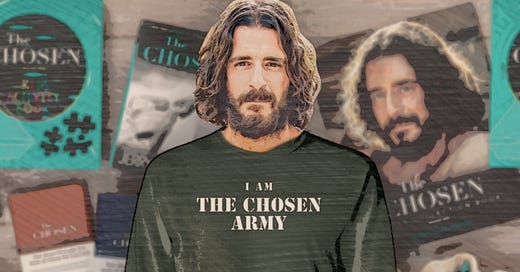



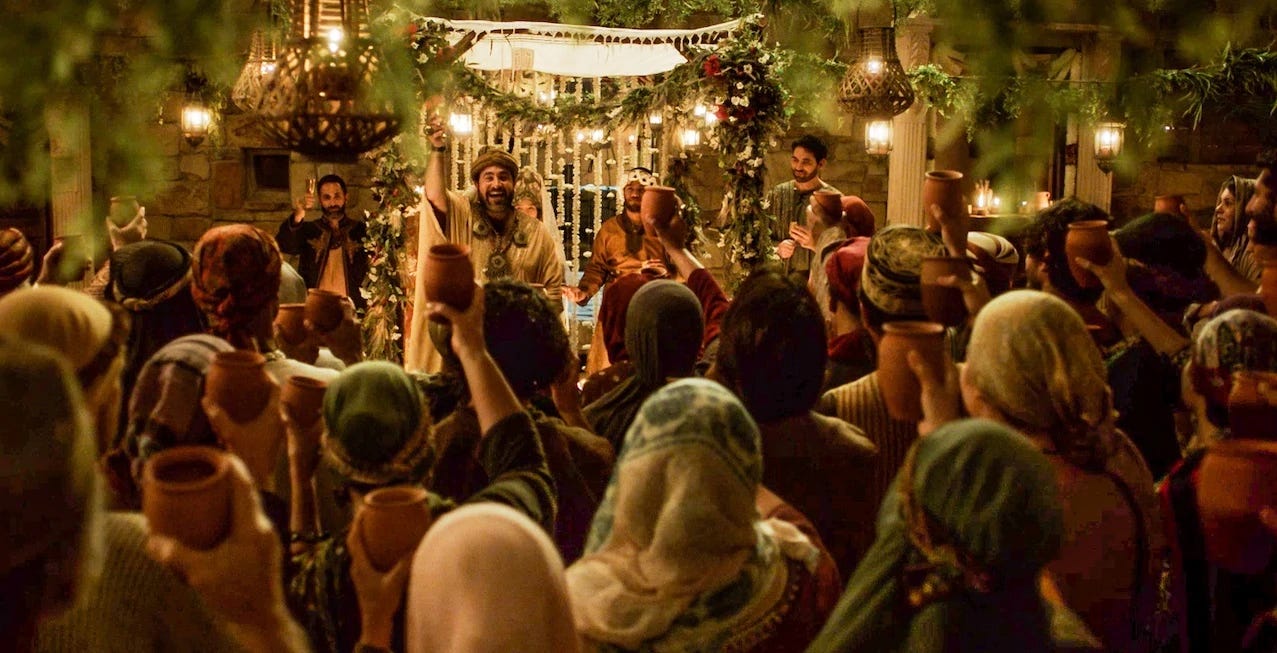
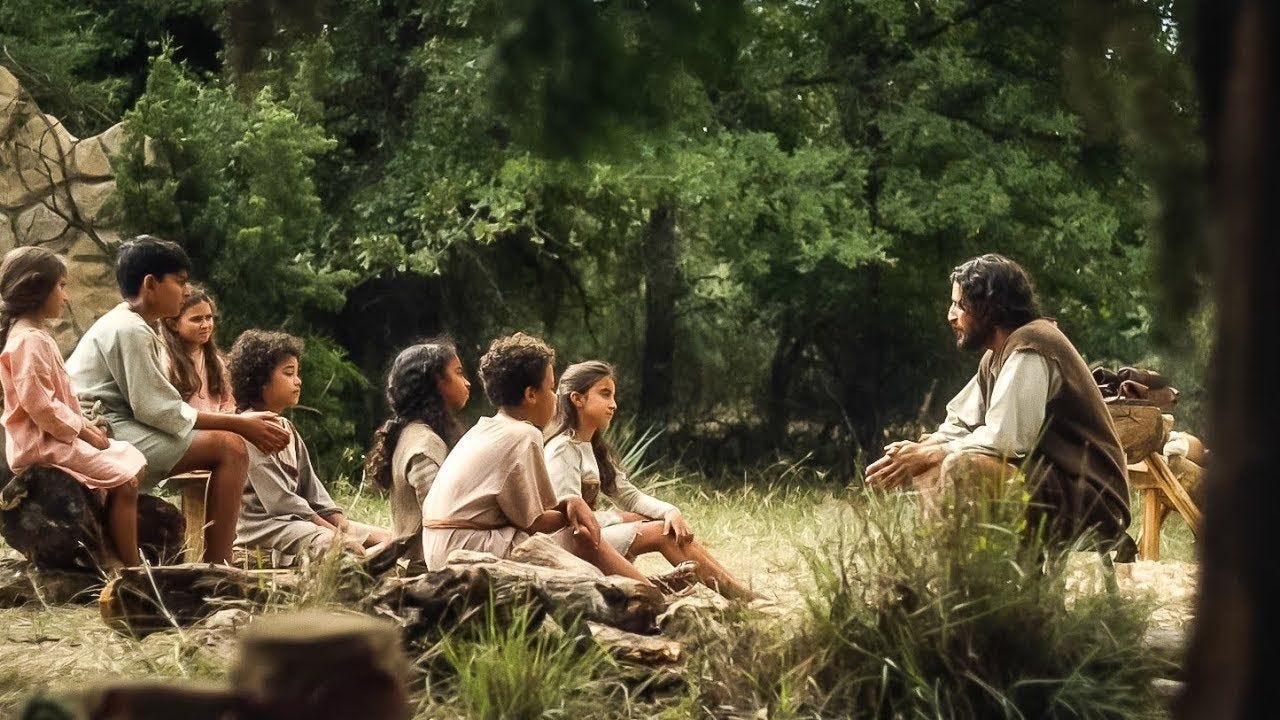
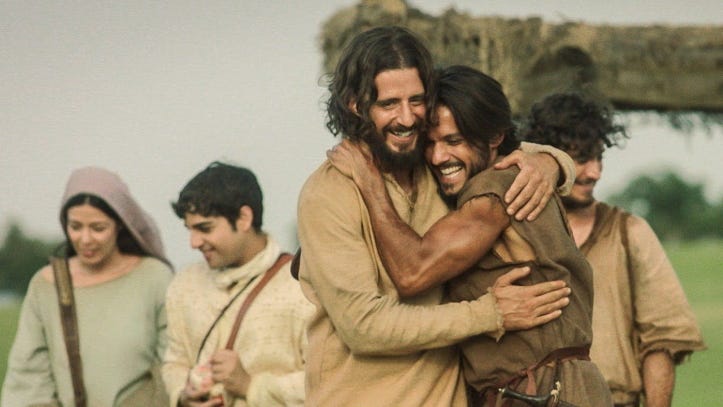

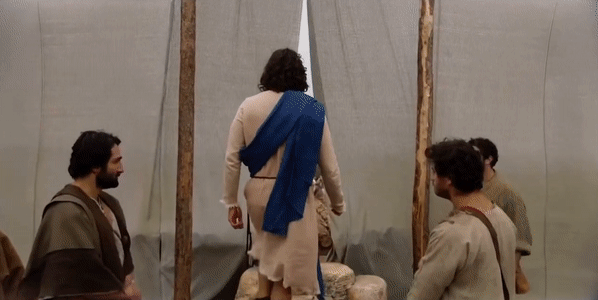
The Jesus Junk Industry.
The monetization of everything is gross.